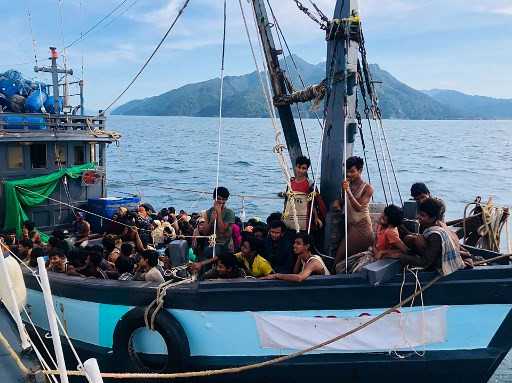Death and despair: Rescued Rohingya describe high-seas terror
28 June, 2020

Several Rohingya say these were beaten by traffickers and drank their private urine to remain alive on a perilous four-month voyage at sea until their dramatic rescue close to the Indonesian coast.
The bedraggled survivors -- about 100 in all, mostly women and children -- described a high-seas horror story that saw them reduced to throwing the dead overboard as their rickety craft drifted a large number of kilometers towards Malaysia.
Two survivors claimed that people smugglers paid to transport them had beaten the Rohingya who were after moved to a fresh boat and abandoned at sea.
These were rescued by fishermen in Indonesia on Wednesday and pulled to shore by locals the very next day, thousands of kilometres south of Bangladesh.
"We suffered so much on that boat," 50-year-aged Rashid Ahmad advised AFP in an immigration detention middle in Lhokseumawe metropolis on Sumatra's northern coast.
"They tortured all of us and cut us. One of us even died.
"There was food initially but when it had been done they [the traffickers] took us onto another boat and let us float away alone," he added.
Another survivor, Habibullah, said: "They beat everyone badly. My ear was chop and I was beaten on the head."
AFP cannot independently verify the accounts of four members of the vulnerable Muslim minority group, who said they tripped earlier this year near a Rohingya refugee camp in Bangladesh, next with their native Myanmar.
Survivor Ziabur Rahman Bin Safirullah, 35, said the group got by on tiny rations of rice and nuts while relying heavily on rainwater to survive.
"Quite often we squashed wet apparel and drank the drinking water from their website," he said, adding that those that died were thrown into the sea.
Korima Bibi said at least two persons died during the voyage and that some up to speed resorted to drinking urine to stay alive, as others got sick from the tough seas.
"We didn't get more than enough food or normal water," the 20-year-previous said, "[but] we survived."
Among the roughly 100 in the group were 48 women and 35 children.
They set off from the Balukhali refugee camp in southern Bangladesh, but were originally from Myanmar's conflict-torn Rakhine State, according to survivors and an account directed at the International Organization for Migration (IOM).
A good spokesperson for the group told the IOM that one female had died along the way, leaving behind her two children.
Another three children, several of these siblings, and a 10-year-old gal were unaccompanied. The group as well included a pregnant woman, according to the IOM.
The smugglers were charging each person about $2,300 to get them to Malaysia, the IOM said.
Around a million Rohingya are in cramped and squalid refugee camps in Bangladesh, where human traffickers as well run lucrative businesses promising to see them sanctuary abroad.
Indonesia, the world's biggest Muslim majority country, and neighboring Malaysia will be favored destinations for Rohingya fleeing persecution and violence found in mostly Buddhist Myanmar.
Thousands get one of these perilous get away via smugglers over the sea each year.
About 1,400 Rohingya have already been stranded at sea this year -- and at least 130 of those have died, according to IOM figures.
The other day, a Malaysian coastguard official reported a large number of Rohingya were believed to have died during a months-long journey compared to that country.
There had actually been a lot more than 300 people up to speed the boat that was intercepted by simply authorities this month, with the 269 survivors given non permanent shelter.
Neighboring Indonesia features previously allowed Rohingya to land and several to stay.
But wary officials have turned them aside lately, worried they could be carrying the deadly coronavirus.
That concern played out in dramatic fashion on a beach in Lhokseumawe on Thursday when the Rohingya survivors were pulled to shore by locals furious at the refusal of authorities to provide them shelter over COVID-19 fears.
They had spent the night several hundred metres offshore, waiting for a decision on if they could land.
Authorities eventually relented -- a good move cheered as a good victory by rights groups. All have since analyzed detrimental for the coronavirus, regional officials said.
But the group's fate continues to be uncertain.
"Äs a good fellow Muslim I felt compassion for them, especially because there were so various children and ladies -- it broke my center," explained Lhokseumawe resident Saiful Hardi.
"I hope we continue to support them as fellow humans."
That decision will be up the government, meaning an uncertain fate for survivors just like 20-year-old Bibi.
"You persons saved us so a thousand thanks a lot for that," she said.
"Now it's up to you."
Source: www.thejakartapost.com
TAG(s):
